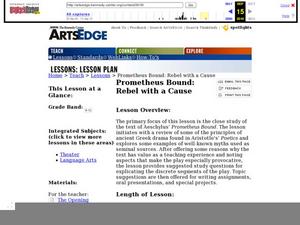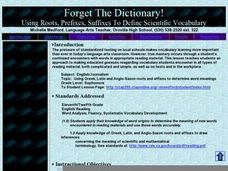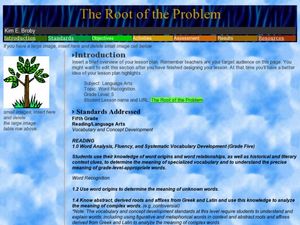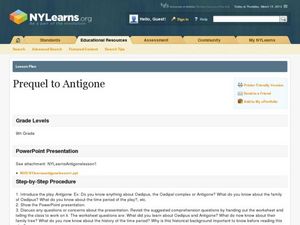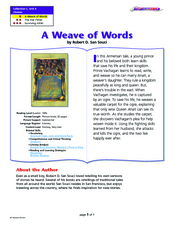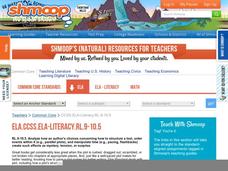EngageNY
Summarizing Complex Ideas: Comparing the Original UDHR and the "Plain Language" Version
The eighth lesson plan in this series continues the focus on vocabulary and increasing young readers' awareness of academic language. Pairs of learners participate in a short vocabulary review activity called Interactive Words in which...
Curated OER
English Words from Greek and Roman Names of Gods
Hydra/hygiene, Muse/music. Many English words are built on roots derived from the names of Greek and Roman gods. After examining a list of Greek and Roman gods and the meaning of their names, class members find the root in a list of...
Curated OER
Prometheus Bound: Rebel with a Cause
If you are teaching Aeschylus' Prometheus Bound, you can't afford to miss this source. An extensive list of ideas outlines numerous discussion topics, writing prompts, comprehension questions, oral presentations, and projects. Have class...
Curated OER
It's All Greek to Me!
While the ideas for Ancient Greek research are solid, there is little detail to help make your job easier. The focus here is familiarizing your class with online databases and print resources in their school library. After direct...
Curated OER
Forget The Dictionary!
Accessing Web sites and playing interactive word games enliven the study of Greek, Latin and Anglo-Saxon roots and affixes. Alas, the link to resources appears broken. Take some time to find game links.
Curated OER
A Walk in the Tundra
Discuss the environment of the Arctic tundra using this resource. The focus of this lesson is the story A Walk in the Tundra by Rebecca L. Johnson. The appealing illustrations are bound to captivate your class! After reading the story,...
Curated OER
The Star Fisher
What a terrific way to discuss racism in the 1920's. Learners read a story called The Star Fisher by Laurence Yep. It is about a Chinese American girl who experiences racism and prejudice after moving from Ohio to West Virginia. Learners...
Curated OER
Going Greek
Third graders learn about the life of a young boy in Greece and all about his cultural heritage. Pupils gather information about the history, culture, and the many influences the ancient Greeks had on modern day society. Terrific video...
Curated OER
Mythological Word Origins
Review myths and the characters therein, connecting them to vocabulary words in the English language today. Begin by searching online for myths and character names. With at least ten names that are familiar English words, students use...
Curated OER
The Root of the Problem
Identifying root and base words is an important skill. Using this lesson, learners practice identifying Greek and Latin roots. However, this resource is incomplete and should be augmented to provide a complete experience.
EngageNY
Mid-Unit 1 Assessment: Human Rights Vocabulary and Common Prefixes
Here is a mid-unit assessment for a group of lessons studying the Universal Declaration of Human Rights (UDHR). The first half of this instructional activity calls for several forms of review. Your class will review the content of the...
EngageNY
Close Reading: The Introduction to the Universal Declaration of Human Rights
As part of a group of lessons, your class will return to the primary text for this unit, the Universal Declaration of Human Rights. Key vocabulary as well as close reading strategies continue to be the focus skills; however, this lesson...
Curated OER
What Does PAN Mean?
Do your middle school scholars need practice decoding words while reading or for spelling? The root word pan is the focus of a nine-step lesson that asks learners to discover ways to figure out the meaning of words built on a root that...
Curated OER
Prequel to Antigone
Trying to find a way to begin your Antigone unit? Use this lesson to introduce your class to the background of Oedipus and Antigone, as well as the historical context. They view a PowerPoint presentation about Oedipus and the story...
Curated OER
A Weave of Woods
Focus on vocabulary, comprehension, and analysis while reading A Weave of Woods, a colorful picture book by Robert D. San Souci. Young learners use worksheets to preview, predict, practice paraphrasing, and make comparisons. The richly...
Shmoop
ELA.CCSS.ELA-Literacy.RL.9-10.5
Your young scholars already know when they like a story and when they don't, but they may not know that the plots of these stories are shaping that opinion. Like all resources in this series, the two activities and quizzes provided here...
Desert Discoveries
Invent - A - Saurus
Fourth graders get to invent their own dinosaur! This is done by using a very clever worksheet embedded in the plan. The worksheet leads them through naming their dinosaur by having explanations of the Latin terminology that is used with...
Time Warp Trio
The Seven Blunders of the World
Learners explore the cultures and civilizations of Mesopotamia. They take a look at the factors that shaped the region, and study the history of the Hanging Gardens of Babylon, and other ancient wonders of the world. The class is divided...
Other popular searches
- Language Arts Greek Heroes
- Powerpoint Greek Language
- English Greek Language
- Learn Modern Greek Language
- Modern Greek Language
- Ancient Greek Language
- Teaching the Greek Language
- Language Arts Greek Mythology
- Learning Greek Language




